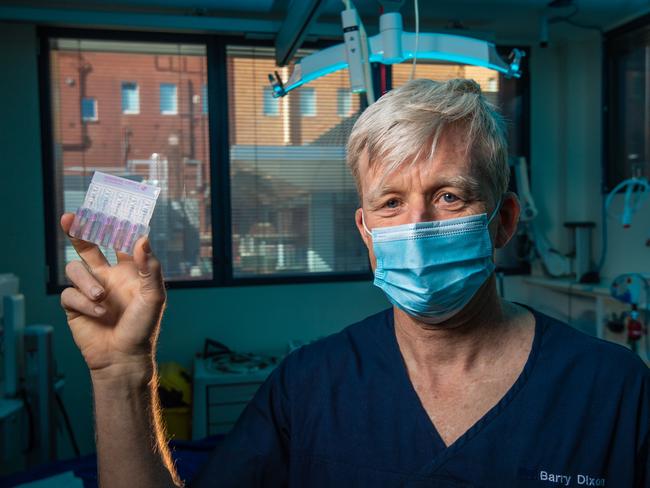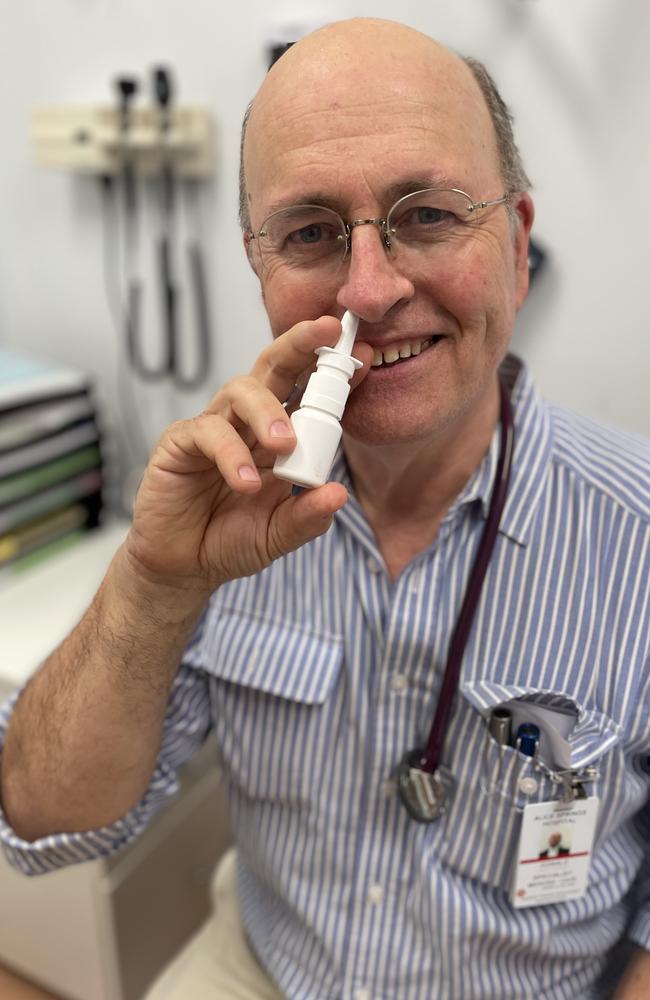A cheap, blood-thinning drug could kill off COVID-19
A commonly used blood thinning treatment could stop coronavirus and its deadly mutant strains, new research reveals.
National
Don't miss out on the headlines from National. Followed categories will be added to My News.
Exclusive: Australian researchers have turned a cheap 100 year blood thinning drug into a nasal spray that could block COVID-19, stop it spreading and treat the illness.
The team of Melbourne scientists, which includes Victoria’s chief health officer Brett Sutton, is seeking funding to test the product, containing the blood thinning medication heparin, on people in hotel quarantine — to see if it works.
It comes as human trials begin to gauge whether AstraZeneca’s COVID-19 injection also works as a nasal spray.
Australia’s leading science research body, the CSIRO, had tested the vaccine as a nasal spray in ferrets — ahead of the human trials — and was waiting for the publication of promising results showing its impact on stopping infection spread.
“We’re confident. We have preclinical studies which are impressive at the moment,” CSIRO’s Rob Grenfell told News Corp.

“We also understand that our colleagues in the UK are conducting various ways of administering, in particular the AstraZeneca vaccine to demonstrate … whether or not it can actually cause what we call nasal neutralisation,” he said.
Another COVID-19 busting nasal spray being developed by Australian company ENA was also in preclinical trials.
And, Melbourne-based pharmaceutical company Starpharma hoped to roll out a nasal spray in Europe next month that is 99.99 per cent effective against COVID-19 when applied before or after exposure.
Nasal spray formulations would work as an accompaniment to COVID-19 vaccinations.
In the case of heparin, Australians would still receive COVID-19 vaccines but the nasal spray would be used three times a day during virus outbreaks, long haul travel and by frontline health and quarantine workers to provide immediate protection by blocking the virus entering the body through the nose.
And, unlike vaccines, heparin would work to block even mutated forms of the COVID-19 virus.
The medication is off patent, so would cost just $10 per bottle to produce and likely retail for $20 a bottle.

The team wants to produce the heparin in Australia.
“The concept is that the intra-nasal heparin will, in fact, prevent the virus from locking onto the ACE2 receptor (in the nasal passage), and prevent it from being internalised and replicating and be associated shedding and spreading,” Monash University pharmacy expert Professor Michelle McIntosh said.
“We’ve been able to show in a petri dish that this concept works. And we have commenced some animal studies,” she said.
The team working on the heparin spray includes researchers from the Peter Doherty Institute the Murdoch Children’s Research Institute, University of Melbourne, St Vincent’s Hospital, Northern Health, Monash University and the CSIRO.
They needs $4 million for clinical studies, which would see the nasal spray tested on 100 people in hotel quarantine in Melbourne and at the Howard Springs centre near Darwin.
The trials would focus on whether the spray blocks the virus and stops infected people shedding the virus.
Previous studies have shown that heparin has antiviral and antibacterial properties and it was effective against other coronaviruses including the original SARS from 2003.
St Vincent’s hospital intensive care specialist Dr Barry Dixon and Northern Hospital physician Dr Don Campbell have been using the heparin nasal spray themselves to ward off COVID-19 as they work on the frontline.
“I’ve been taking it up my nose two puffs each nostril three times a day since July,” Dr Campbell said.
Testing showed there was zero absorption of the product into his body so there was no risk of bleeding from the drug’s blood thinning properties, he said.
Dr Dixon said he and another colleague used the heparin spray while treating COVID-19 patients during the Melbourne outbreak and “I didn’t get COVID but I was also wearing PPE”.
Meanwhile, a clinical study by Dr Dixon published in the journal called Lancet Respiratory Medicine last week showed heparin also holds promise as a COVID-19 treatment.
Before the pandemic started patients given heparin through nebulisers had a significantly improved lung recovery, fewer patients got acute respiratory distress syndrome and they returned home sooner.
Originally published as A cheap, blood-thinning drug could kill off COVID-19



